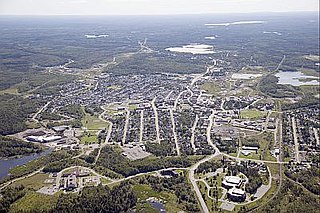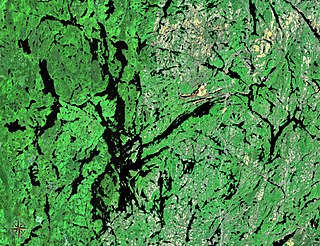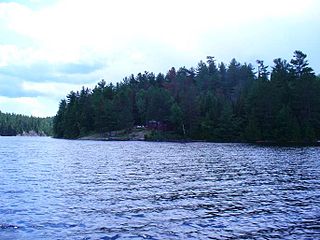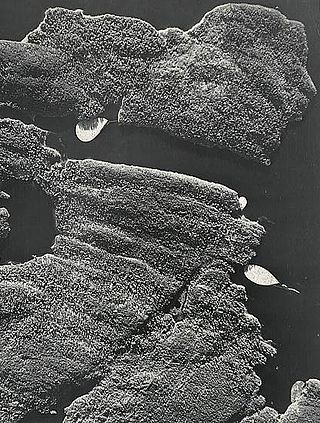Related Research Articles

Sir Oliver Mowat was a Canadian lawyer, politician, and Ontario Liberal Party leader. He served for nearly 24 years as the third premier of Ontario. He was the eighth lieutenant governor of Ontario and one of the Fathers of Confederation. He is best known for defending successfully the constitutional rights of the provinces in the face of the centralizing tendency of the national government as represented by his longtime Conservative adversary, John A. Macdonald. This longevity and power was due to his maneuvering to build a political base around Liberals, Catholics, trade unions, and anti-French-Canadian sentiment.

Kirkland Lake is a town and municipality in Timiskaming District of Northeastern Ontario. The 2016 population, according to Statistics Canada, was 7,981.

Larder Lake is an incorporated municipal township and eponymous constituent dispersed rural community in Timiskaming District in Northeastern Ontario, Canada. It is located along Ontario Highway 66 and Ontario Highway 624 at the north-western part of the lake bearing the same name. The area of the township is 229.65 km2 (88.67 sq mi) and includes the geographic townships of Hearst, McVittie and Skead.

McGarry is an incorporated township in Timiskaming District in Northeastern Ontario, Canada. It includes the communities of Virginiatown, North Virginiatown, and Kearns. The township borders with Quebec to the east, along Highway 66 between Kirkland Lake and Rouyn-Noranda. The northern border of the township forms part of the border between Timiskaming District and Cochrane District. Highway 66 was rerouted in 2017 because of concerns that aging mine shafts under the road could cause it to collapse.
White bear may refer to:

Lake Temagami, formerly spelled as Lake Timagami, is a lake in Nipissing District in northeastern Ontario, Canada, situated approximately 80 km north of North Bay. The lake's name comes from dimii-agamiing "tih-MEE-uh-guh-MEENG", which means "it is deep water by the shore" in the Ojibwa language.
Bear Island is an island in Lake Temagami of Northeastern Ontario, Canada. With an area of 4.66 km2 (1.80 sq mi), it is the second largest island in Lake Temagami after Temagami Island. Much of Bear Island is in Joan Township, a geographic township that also includes the Joan Peninsula to the northwest.

Jumping Cariboo Lake, sometimes incorrectly spelled Jumping Caribou Lake, is a lake located within the Municipality of Temagami, in the Nipissing District, Ontario, Canada. It contains small islands and hidden bays. Ojibwa natives of the area have given the lake its name.

Temagami, formerly spelled Timagami, is a municipality in northeastern Ontario, Canada, in the Nipissing District with Lake Temagami at its heart.
The White Bear Forest is an old growth forest, located in Temagami, Ontario, Canada. The forest is named after Chief White Bear, who was the last chief of the Teme-Augama Anishnabai before Europeans appeared in the region. In some parts of the White Bear Forest trees commonly reach 200 to 300 years in age, while the oldest tree accurately aged in White Bear Forest was a red pine that was 400 years old in 1999. The White Bear Forest contains one of Canada's oldest portages, dating back some 3,000 years. Today, more than 17 km (11 mi) of trails access the White Bear Forest. A trail guide is available online at http://ancientforest.org/whitebear.html.

The Teme-Augama Anishnabai is the Indigenous Anishinaabe community of the Temagami First Nation. The ancestors of Teme-Augama Anishnabai have trapped and hunted animals in the Temagami region of Canada for over 5,000 years. Bear Island on Lake Temagami is home to the Indigenous community.
The Temagami River, formerly spelled as Timagami River, is a river in the Nipissing District of Ontario, Canada, in the Temagami region. Its source is Lake Temagami and flows through Cross Lake and Red Cedar Lake. It flows into the Sturgeon River at the community of River Valley.

Cassels Lake is a lake located within the Municipality of Temagami, in the Nipissing District, Ontario, Canada. It contains numerous portages, campsites and is one of three lakes on the eastern edge of the White Bear Forest. The lake is named in honour of Sir Walter Cassels, President of the Exchequer Court of Canada.
The Temagami First Nation is located on Bear Island in the heart of Lake Temagami, the second largest in Lake Temagami after Temagami Island. Its community is known as Bear Island 1. Temagami First Nation (TFN) members are status Indians under the Indian Act that live on and off Bear Island.
Gary Potts was a chief of the Temagami First Nation and the Teme-Augama Anishnabai in Temagami, Ontario, Canada. He was chief in August 1973 when the Temagami Land Caution began with land claims being filed with title offices to prevent development on Crown land.
The Temagami Land Caution was a territorial dispute in the Temagami area of Northeastern Ontario, Canada. In 1877, deputy chief Ignace Tonené filed a land claim concerning the Temagami region with the Parry Sound federal Indian Agent. The modern land claim was filed with land title offices in August 1973 by Gary Potts, then Chief of the Teme-Augama Anishnabai Indigenous Nation. The caution was intended as a way of maintaining 10,000 km2 (3,900 sq mi) of land that they claimed as "n'Daki Menan", meaning "Our Land". Existing throughout much of the 1970s and 1980s, it effectively prevented all types of development on Crown land, such as mining. Crown land sales were also prohibited due to the Temagami Land Caution. In 1988, Vince Kerrio approved the expansion of Red Squirrel Road directly through the Temagami Land Caution. This prompted a series of roadblocks by the Teme-Augama Anishnabai and by environmentalists in 1988–1989. In 1991, the Supreme Court of Canada ruled that the Teme-Augama Anishnabai gave up rights to the land via the 1850 Robinson Treaty despite the Tema-Augama Anishnabai claiming that they never signed or consented to the treaty. The Temagami Land Caution was lifted in 1995 as a result of a court order by the Supreme Court of Canada.

Ignace Tonené, also known as Nias or by his Ojibwe name Maiagizis, was a Teme-Augama Anishnabai chief, fur trader, and gold prospector in Upper Canada. He was a prominent employee of the Hudson's Bay Company.

Mount Kanasuta, often known as Mont Kanasuta, is a hilled area near the Quebec–Ontario border in the Abitibi-Témiscamingue administrative region of Quebec, Canada.
Chief Tonene Lake is a lake in the Timiskaming District of Ontario, Canada.
Peter Nebenegwune, commonly known as Nebenegwune, was the head chief, of the Temagami First Nation in Ontario, Canada.
References
- 1 2 3 4 5 Hodgins, Bruce W.; Benidickson, Jamie (1989). The Temagani Experience: Recreation, Resources, and Aboriginal Rights in the Northern Ontario Wilderness, Canada: University of Toronto Press, ISBN 978-0802067135 p. 35, 40–48, 66, 299
- 1 2 White Bear Old Growth Forest Trail Guide Retrieved on 2007-06-27
- ↑ Charles Hallock, William A. Bruette, Forest and Stream. (1904). United States: Forest and Stream Publishing Company. p.117